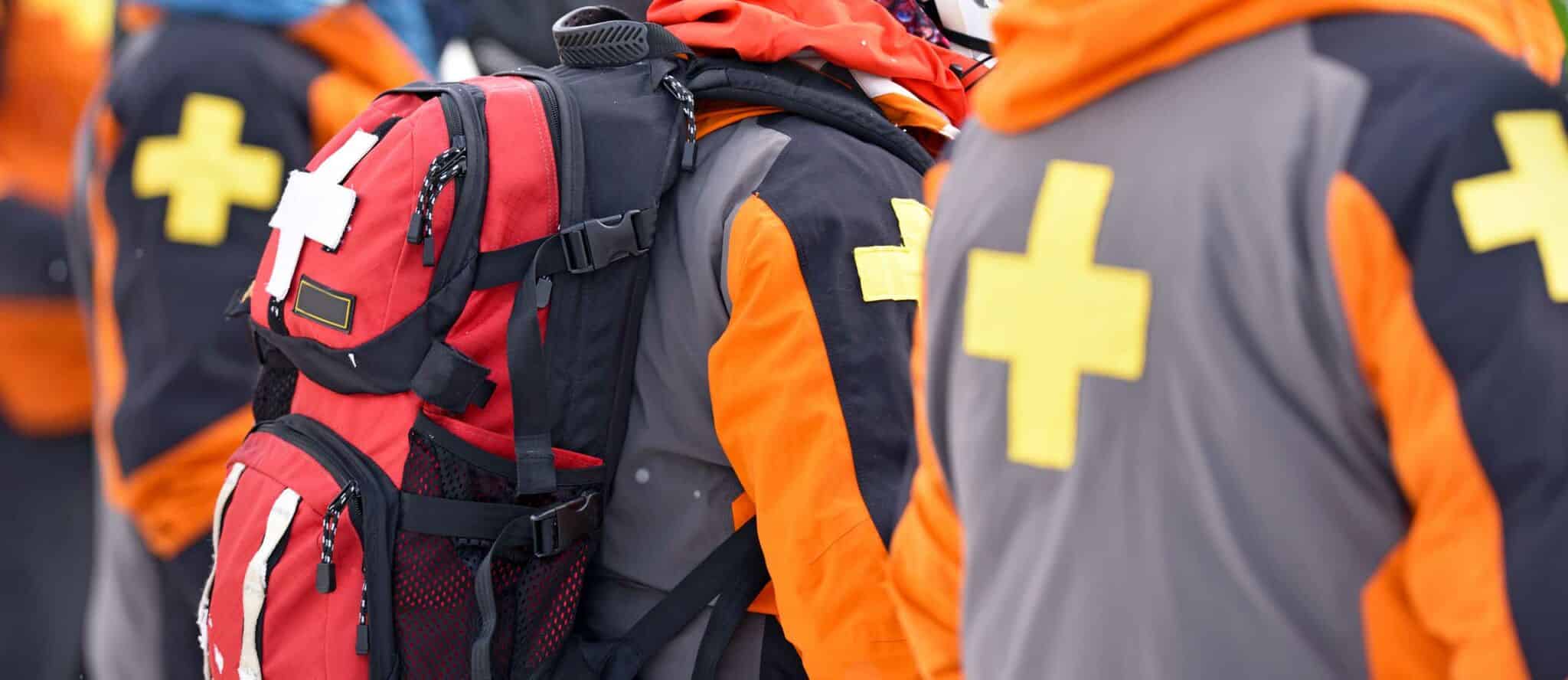
The Master’s Degree in Prevention and Emergency in Mountain and High-Altitude Territories trains healthcare professionals in the preventive, emergency-urgency nursing and psychological areas, and is addressed to graduates in environmental and workplace prevention techniques, nursing or other healthcare, psychology, engineering and environmental degrees dealing with specific mountain-related interventions.
The Master wishes to convey competencies in the organizational, preventive and operating field, so that the attendees can gain suitable training to plan intervention lines and manage any possible issues.
Trained professionals are capable of using their knowledge of the complex emergency rescue system in mountain and high altitude environments, in order to consider the dynamic aspects of the intervention, as well as the protection of operators and users.
The Master’s Degree in Prevention and Emergency in Mountain and High Altitude Territories describe the emergency prevention aspects to safely work at high altitudes.
Apart from in-class lessons, there will be field trips such as:
- Geology: hikes on the territory, observation of landslides and on-field map reading;
- Meteorology: day of training at the Arabba Weather Centre;
- Mountain emergencies: hands-on activities on the rock wall, introduction to rafting and analysis of the main risks related to canyoning.
The 200 hours of stage will be completed in 6 different contexts:
- Suem Station in Pieve di Cadore;
- Emergency Room (Belluno or Feltre or Agordo);
- Corpo Nazionale Soccorso Alpino Speleologico Veneto (Belluno);
- Provincial Fire Brigade (Belluno);
- Collegio regionale delle guide Alpine (Belluno);
- Federazione Nazionale Sicurezza Piste Sci (Belluno).
The Master’s Degree in Prevention and Emergency in Mountain and High Altitude Territories provides participants with in-depth knowledge to assess the risk related to the peculiar working activities present in the mountain territory. Concerning emergency interventions, it provides a preventive culture to protect the health of users and of the staff usually employed in these operations, and it also considers the environmental aspects of the scenario where the emergency takes place. It develops specialized competencies in the preventive and intervention field on the system operation in its different aspects, promoting a multidisciplinary vision whose ultimate end is protecting the health of the individuals and of the population. Professional opportunities include work within emergency operative units, SUEM 118 of healthcare units. Professional outlets also include work in the private and non-profit sector.
The Master’s Degree in Prevention and Emergency in Mountain and High Altitude Territories provides training on:
- Physiological adaptations and high-altitude physical activities: organism’s response to high-altitude exposure: acute and chronic altitude sickness. High altitude pulmonary and cerebral oedema.
- Metabolism and modifications induced by high altitude environments: functional blood biochemistry. Regulation mechanisms. Hormonal adaptations.
- Nutrition and health in the mountains: nutritional needs. Metabolic adaptation.
- High altitude pathologies: traumatic and non-traumatic pathologies at high altitudes. Physiological responses of the breathing system. Effects of physical activities at high altitude. Neurological complications.
- First-aid in the mountains: setting security and 4-look technique: primary evaluation (ABCDE) and secondary evaluation. Emergency, recovery call. Patient mobilization/immobilization techniques, transportation systems. Avalanche victims. Hypothermia. Stuck on the rock syndrome.
- Mountain emergencies: preparing a hike and basic knowledge. Use of new technologies, smartphone, Web, GPS. Knowing how to read a topographic map; minimum equipment in the backpack; PPE in summer and winter impervious environment. Progression techniques on rock, ice and snow.
- Mountain rescue and pathology management: high-altitude pathology management. Handling in mountain environments and organization of healthcare units during sports events.
- Meteorology at high altitude: meteorological aspects of the alpine environment, meteorological changes. Reading the signs for a personal forecast.
- Agro-forestry-pastoral activities in mountain environments: introduction to the main forestry-pastoral activities in mountain environments, with particular focus on forestry and agricultural works: main work systems, the most widespread machines and equipment used, and related risks for operator safety.
- Geology and hazardousness in mountain areas: geomorphological processes in the mountain environment: Preventive assessment of the geomorphological hazardousness and field observation. Cartography and risk maps.
- Adverse events: emergency reaction system. Civil Protection system: C.N.VV.F and emergency plans. Risk concepts. Emergency scenarios.
- Prevention activities: public healthcare emergencies, natural disasters. Rescue vehicle organization. Human ecology in high-altitude environments.
- Work accidents, occupational disease and mountain work: organization of interventions in mountain settings, workplace safety. Biological risk and macro-climate risks.
- Legal liability: medical act justification causes. Fundamentals of forensic pathology.
- Psychological aspects of communication management: psychological aspects of risk communication. Bad news communication.
AULSS 1 Dolomiti: traineeship in the healthcare-emergency sector is completed at the Emergency Units of Belluno, Feltre, Agordo, and at the SUEM 118 Operating Centre of Pieve di Cadore
- Provincial Fire Brigade of Belluno: completion of the hands-on practice concerning:
-
- road accidents with vehicles;
- techniques and equipment for high-altitude work;
- water (lake) environment with boats;
- rescuing people in tunnels and/or collapsed building with the dog unit;
- B.C.R..
- Corpo Nazionale Soccorso Alpino e Speleologico Veneto – Dolomiti Bellunesi: with the CNAS, the following Alpine rescue areas will be covered, with several field trips in different places of our Region. Specifically, field trips concern:
-
- avalanche victims;
- rescue on rock walls;
- search for missing person;
- rescue on impervious environments;
- rescue on glaciers;
- caves.
- Federazione Nazionale Sicurezza Piste Sci: trainers will focus on the topic of rescue on ski slopes, with a field trip on the slopes on skis or snowmobile, with rescue aids, vehicles and techniques used on this kind of terrain.
- Collegio Regionale Guide Alpine: in this traineeship, students are gradually introduced to the mountains, starting from the classroom, and continuing with the rock wall, mountain, and the fun canyoning activity.
Follow us on social media, for the latest news on the Master’s activities:
https://www.facebook.com/MasterPrevenzioneEmergenza
In this channel, you will find all the news and multimedia content of all the activities carried out in the current and in past editions.
https://www.instagram.com/masterprevenzioneemergenza/
In this channel, you will find multimedia content, stories shared by us and our students.
The general ranking of merit will be published on the Italian page of this Master according to the timing provided in the Call.
Information
FAQ
Traineeship attendance is 100% mandatory. Traineeship cannot be completed in other seats.
No, there will be no an admission test. Ranking is done through the resume.
No, no technical or physical skills are required. At the beginning of the Master, you will complete a survey to assess your skills and experiences, so that an individual path based on each student’s capacity can be structured.
The Master includes 300 hours of lessons and 200 hours of traineeship and/or project work. Lessons will be held on Friday and Saturday, every two week, at the Feltre seat of the University of Padua.
The 300 hours of traineeship will be completed on site, through practical exercises, and outside, with the use of dummies for simulations and role playing. In case of specific impediments due to healthcare or work issues, lessons can be followed online. A mandatory attendance of 70% is required. The dissertation will be discussed at the end of the training path.

